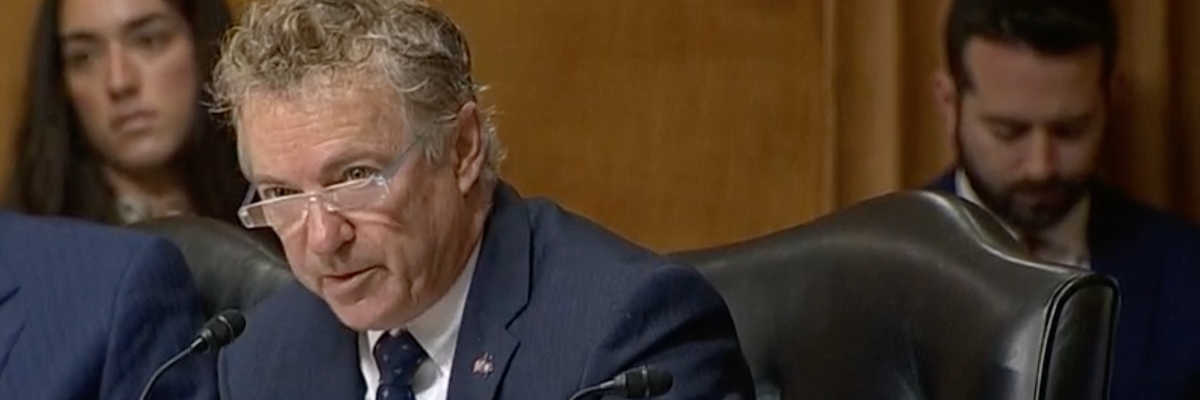Amid shifting battlefield and political dynamics in Kyiv and Washington, Sen. Rand Paul (R-Ky.) accused the State Department of resembling a “department of war” more than a “department of diplomacy” in its approach to the conflict in Ukraine during a Senate Foreign Relations Committee hearing on Wednesday.
“Do you really believe that Ukraine is going to push Russia out of Ukraine? They're gonna push them out of Crimea and (...) that Zelensky’s position that ‘we will not negotiate until they’re gone from Ukraine’ is viable?” Paul asked during a testy exchange with James O’Brien, the Assistant Secretary of State for European and Eurasian Affairs. “You would think that as a superpower, we would be involved somewhat with encouraging negotiation, but I've heard nothing from you, and nothing from anyone in your administration, frankly, that talks about negotiating.”
“There are actually some who say we're back to about where we started as far as negotiating and tens of thousands of people died on both sides and we haven't been successful,” Paul added. “But I still hear only war and I don't hear diplomacy.”
In his response, O’Brien acknowledged that the war would end at the negotiating table once Ukraine is prepared to, and added that at this time, Moscow is not a viable negotiating partner. O’Brien noted that he had recently spent a weekend with representatives from 66 other countries to discuss what peace should look like.
“Russia didn’t show up,” O'Brien said, though reports say that Russia has not been invited to any of three three successive meetings aimed at shoring up support for Ukraine’s vision of a peace plan, including the one held in Malta late last month.
“Putin is not serious about negotiating the end of the war. He has said he wants to wait and see what happens in November ‘24,” O’Brien said. “So we're preparing for that eventuality. So we can have a negotiation that will actually stick as opposed to the track record of broken agreements that President Putin has made with a whole range of his neighbors up until now.”
“This is the wrong time to walk away because Ukraine's winning,” added O’Brien later in the hearing. “It's already taken back half the territory Putin’s seized since February 22. It's opened up the Black Sea grain lanes that Putin tried to shut down in July.”
"I haven’t seen any evidence that the Biden administration is willing to entertain negotiations to end the slaughter in Ukraine," Paul told RS after the hearing. "Based on O’Brien’s response today, the Biden administration seems to only be interested in war not diplomacy.”
Most other Senators on the committee agreed that the war is at a crucial turning point but interpreted the precarious situation on the ground as a signal that Western military support was more important than ever.
To make the case for continued aid, much of the focus was on the imperative of passing the White House’s proposed emergency supplemental spending package, emphasizing the links between Russia, China, Iran, and Hamas, and therefore the importance of passing legislation that would combat them all.
“By degrading Russia's military capabilities, we're also degrading the capabilities of those who Russia works with, like Iran, Hamas, and Hezbollah,” said committee Chairman Sen. Ben Cardin (D-Md.) during his opening statement. “We see these actors in concert not in isolation, which is why we need to consider the whole supplemental package.”
There was little mention of a recent acknowledgement from Ukraine’s top commander that his forces were locked in a “stalemate” with Russia on the battlefield and subsequent reports that Washington and Europe are quietly discussing the possibility of negotiations with Kyiv. Outside of Sen. Paul’s back-and-forth with O’Brien, there was little discussion of an endgame.
One exception came from Sen. James Risch (R-Idaho), the ranking member on the committee, who bemoaned the Biden administration’s lack of urgency with providing the necessary weapons to Ukraine. “This thing can’t go over forever,” Risch said in his closing remarks. “You've got to escalate. If you don't escalate, you're gonna lose. ...[The administration] still needs to do more on ATACMs and I want to see the F-16s. Give it to them and let them get this thing over with so we can move on.”
















